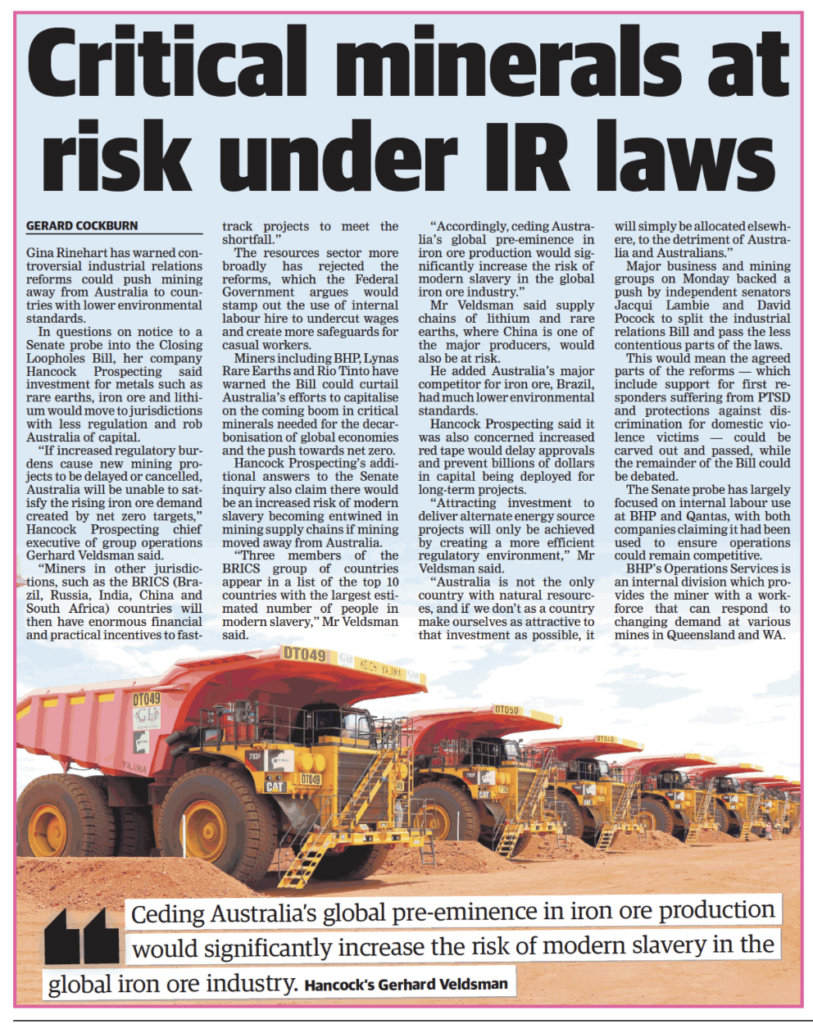

Article by Gerard Cockburn courtesy of The West Australian.
Gina Rinehart has warned controversial industrial relations reforms could push mining away from Australia to countries with lower environmental standards.
In questions on notice to a Senate probe into the Closing Loopholes Bill, her company Hancock Prospecting said investment for metals like rare earths, iron ore and lithium would move to jurisdictions with less regulation and rob Australia of capital.
“If increased regulatory burdens cause new mining projects to be delayed or cancelled, Australia will be unable to satisfy the rising iron ore demand created by net zero targets,” Hancock Prospecting chief executive of group operations Gerhard Veldsman said.
“Miners in other jurisdictions, such as the BRICS [Brazil, Russia, India, China and South Africa] countries will then have enormous financial and practical incentives to fast-track projects to meet the shortfall.”
The resources sector more broadly has rejected the reforms, which the Federal Government says will stamp out the use of internal labour hire to undercut wages and create more safeguards for casual workers.
But companies such as BHP, Lynas Rare Earths and Rio Tinto argue the Bill could curtail Australia’s efforts to capitalise on the coming boom in critical minerals that will be needed for the decarbonisation of global economies and the push towards net zero.
Hancock Prospecting and Roy Hill’s additional answers to the Senate inquiry also claim there would be an increased risk of modern slavery becoming entwined in mining supply chains if mining moved away from Australia.
“Three members of the BRICS group of countries appear in a list of the top 10 countries with the largest estimated number of people in modern slavery,” Mr Veldsman said.
“Accordingly, ceding Australia’s global pre-eminence in iron ore production would significantly increase the risk of modern slavery in the global iron ore industry.”
Mr Veldsman said supply chains of lithium and rare earths, where China is one of the major producers, would also be at risk.
He added Australia’s major competitor for iron ore, Brazil, had much lower environmental standards.
Hancock Prospecting said it was also concerned that increased red tape would delay approvals and prevent billions of dollars in capital being deployed for long-term projects.
“Attracting investment to deliver alternate energy source projects will only be achieved by creating a more efficient regulatory environment,” Mr Veldsman said.
“Australia is not the only country with natural resources, and if we don’t as a country make ourselves as attractive to that investment as possible, it will simply be allocated elsewhere, to the detriment of Australia and Australians.”
Major business and mining groups on Monday backed a push by independent senators Jacqui Lambie and David Pocock to split the industrial relations Bill and pass the less contentious parts of the laws.
This would mean the agreed parts of the reforms — which include support for first responders suffering from PTSD and protections against discrimination for domestic violence victims — could be carved out and passed, while the remainder of the Bill could be debated.
The Senate probe has largely focused on the internal labour use at BHP and Qantas, with both companies claiming it had been used to ensure both operations could remain competitive.
BHP’s Operations Services is an internal division which provides the miner with a workforce that can respond to changing demand at various mines in Queensland and WA.
It has argued the removal of that function would cost the company billions and thousands of high-paying jobs in the mining sector.
Qantas has argued the use of internal labour hire for cabin grew and ground services was used to keep the company competitive with global airlines and Virgin Australia, claiming the legacy bargaining agreements were outdated and cumbersome.















